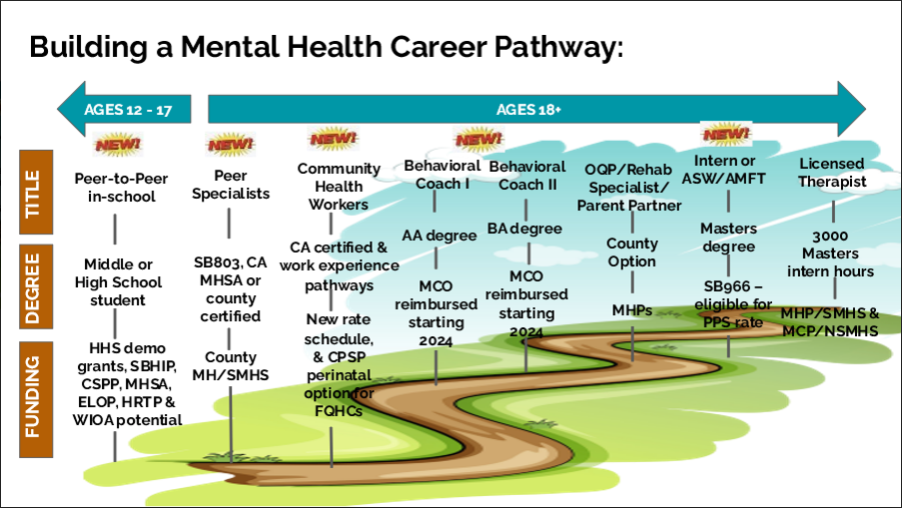Financing Opportunities for PRACTICE: At-A-Glance
ACEs Aware and related efforts across California have significantly changed the way we identify populations who may benefit from support and connect them to the services they need. Leveraging new payment opportunities can create more time and team to improve the health and well-being of families and communities, and contribute to the broader goal of health equity.
PRACTICE compiled this At-A-Glance funding to depict one-time and ongoing funding sources for workforce types, services and infrastructure to create an ACEs ecosystem of coordinated services across organizations and care settings. The resources following the table are organized to help PRACTICE teams understand and frame Medi-Cal funding opportunities in light of ACE screening and response work. Teams should consider what service or workforce gaps exist in their respective ACEs network of care, how funding opportunities can bolster response to screening, and how the eligibility criteria and application / training requirements align with organizational priorities, clinical workflows, scopes of service and patient populations.

1Reimbursement anticipated to begin in 2024
2Organizations must have a contract with a county mental health plan in order to be reimbursed for services delivered by this provider type.
Services
Care Coordination
Enhanced Care Management
- Fact Sheet: Enhanced Care Management and Community Supports Early Implementation
- Fact Sheet: CalAIM Enhanced Care Management Program Initiative
- Specialty Mental Health Services: Criteria for ECM
- Coding Pages 1-3: Enhanced Care Management and Community Supports Coding Options
- Billing & Invoicing: CalAIM Data Guidance: Billing and Invoicing between ECM/ Community Supports Providers and MCPs
- Pages 3-9: Submission Guidance
Community Supports
- Fact Sheet: Enhanced Care Management and Community Supports Early Implementation
- Fact Sheet: CalAIM Community Supports Program Initiative
- Implementation: Medi-Cal Community Supports, or In Lieu of Services (ILOS)Policy Guide
- Pages 3-4: Introduction & Definitions
- Pages 7-54: Service Definitions
- Page 63: Approval for New Community Supports
- Page 64: Provider Enrollment, Credentialing, and Vetting Requirements
- Coding Pages 4-9: Enhanced Care Management and Community Supports Coding Options
- Billing & Invoicing: CalAIM Data Guidance: Billing and Invoicing between ECM/ Community Supports Providers and MCPs
- Pages 3-9: Submission Guidance
PATH CITED
- Fact Sheet: CalAIM Providing Access and Transforming Health (PATH)
- Fact Sheet: Funding Opportunities Cheat Sheet
IPP
- Fact Sheet: Funding Opportunities Cheat Sheet
- FAQ: CalAIM Incentive Payment Program FAQ
Behavioral Health
Dyadic Therapy
- Fact Sheet: Dyadic Behavioral Health
- Press Release: Dyadic Services Added as Medi-Cal Benefits and Psychotherapy Updates
- Implementation: Dyadic Care Services and Family Therapy Benefit
- Page 2: Dyadic Care Requirements & Qualifications
- Page 3: Member Eligibility Criteria
- Pages 3-4: Covered Services
- Page 8: Provider Enrollment / Billing, Claims & Payments
- Coding Pages 13-20: DHCS Provider Manual: Non-Specialty Mental Health Services: Psychiatric and Psychological Services
Family Therapy
- Implementation: Dyadic Care Services and Family Therapy Benefit
- Pages 6-8: Family Therapy Benefit
- Implementation Page 4: DHCS Provider Manual: Non-Specialty Mental Health Services: Psychiatric and Psychological Services
Workforce Development
Community Health Worker Benefit
- Fact Sheet for FQHCs: Understanding the CHW & Doula Medi-Cal Benefit as a CHC
- Fact Sheet for non-FQHCs: Medi-Cal Covers Services Provided by Community Health Workers/Promotoras
Doulas
- Fact Sheet for FQHCs: Understanding the CHW & Doula Medi-Cal Benefit as a CHC
- Fact Sheet: Doula Services as a Medi-Cal Benefit
- Page 1: Definitions & Covered Services
- Page 2: Billing Codes
- Page 6: Documentation & Eligibility
- Pages 7-8: Minimum Qualifications & Recommended Trainings
Wellness Coach: HCAI shared research on the wellness coach model, formerly referred to as behavioral health coaches. As of December 2022, HCAI was developing a certification process and establishing funding opportunities. More information is available here.
Peer Support Specialists
- Certification: California Peer Certification
- Implementation: Medi-Cal Peer Support Specialist Certification Program Implementation
- Pages 3-4:Program Standards/Application & Submission Requirements
- Pages 5-8: Standards for Initial Certification, Biennial Renewal, Lapsed Certification, Areas of Specialization, Grandparenting, State/County Reciprocity, Complaints and Corrective Actions
- Pages 9-10: Medi-Cal Peer Support Specialist Certification Program Plan Submission Requirements
- Pages 11-18: Medi-Cal Code of Ethics for Peer Support Specialists in California
- Page 19: Practice Guidelines and Supervision Standards
- Pages 20-22: Annual Reporting Requirements
Behavioral Health Clinicians (Fully Licensed Clinicians and Associate Licensed Clinicians)
- Billing: ASW & AMFT FAQ
- Billing: LMFT Services at FQHCs FAQ

Grant Opportunities
Evidence-Based Practice Grants
- Description: Evidence-Based Practices and Community-Defined Evidence Practices Grant Program
- Application: Evidence-Based Practices and Community-Defined Evidence Practices Grant Program: Round 1 RFA
Community School Partnership Grants
- Description: California Community Schools Partnership Program: Implementation Grant
- Application: RFA
California Department of Health Care Access and Information (HCAI)
- Description: The HCAI Peer Personal Training Program grant supports applicants with implementation of peer personnel training and placement programs. Applications open on January 2, 2024 and close on March 1, 2024. The grant guide is available here.
- Description: Health Professions Pathways Program (HPPP) is designed to recruit and support students from underrepresented regions and backgrounds to pursue health careers. Applications are due by October 16, 2023.



